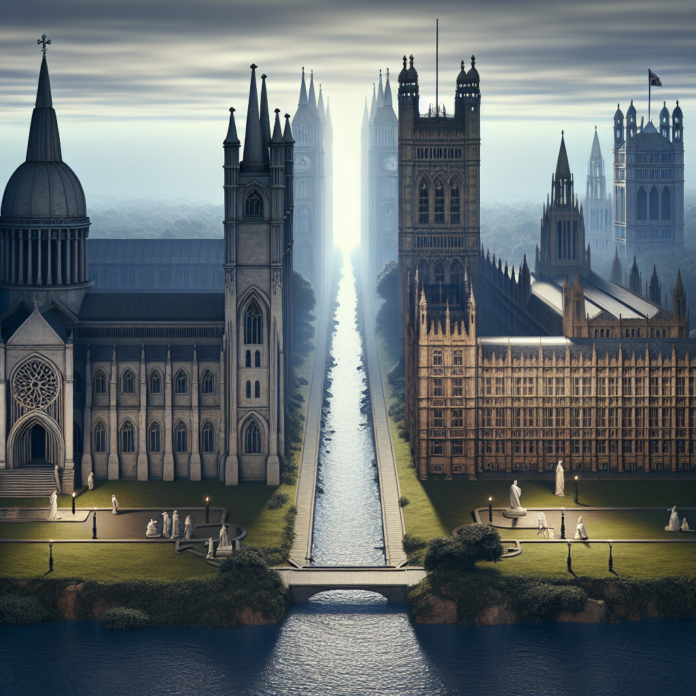From Pulpit to Podium: Dangers of the Catholic Church in Political Leadership
In the ever-shifting landscape of global politics, the blend of religion and state affairs remains a perennial point of contention. Among many religious organizations, the Catholic Church wields considerable influence, with its teachings and deep historical roots reaching far into the political realm. While many may argue for the positive effects of moral guidance in governance, there are pressing dangers associated with the merging of the church, especially its conservative factions, into political leadership.
Throughout history, the Catholic Church has played a significant role in shaping societies. Initially, the Church’s impact on political matters was seen positively, with its canon laws gradually evolving to include principles of justice and human rights. During the Middle Ages, however, the intertwining of church and state power only served to suppress dissent and progress. The Crusades, the Inquisition, and the persecution of heretics exemplified a period of history when conservative religious leaders held sway over political decisions, often with devastating consequences.
Fast forward to the 21st century, debates around the Catholic Church’s role in politics have taken on new dimensions. The Church today is not monolithic; it embodies a broad spectrum of beliefs and practices, from staunch traditionalism to forward-thinking progressivism. Notably, Pope Francis has emerged as a beacon of progressive values, championing inclusive and compassionate stances on issues including climate change, economic inequality, and social justice. His leadership has been refreshing for many, a significant departure from the more rigid interpretations that have historically dominated the Church’s political forays.
Yet, despite this progressive wave, a conservative faction rooted deeply in traditionalism continues to exert considerable influence. This group often emphasizes a return to pre-Vatican II liturgical practices, epitomized by the Latin Mass, which symbolizes a broader resistance to modern interpretations of Catholic doctrine. This nostalgia for a bygone era carries with it an authoritarian mindset that can permeate political leadership with rigid conservatism.
Traditionalists within the Church’s hierarchy often lobby aggressively to influence lawmaking, particularly on issues of family planning, LGBTQ+ rights, and gender equality. Their worldview calls for a return to "natural law" as understood through a historical, often patriarchal, lens. For instance, the opposition to contraceptive use and same-sex marriage are constant reminders of an adherence to outdated doctrines that infringe upon personal freedoms and human rights. By infiltrating political spheres, these conservative Orthodox beliefs risk imposing a homogenous moral order that is out of touch with the diverse and pluralistic societies of today.
One notorious example can be seen in the influence exerted by conservative Catholic leaders over the political landscape in countries like Poland and the Philippines. In Poland, the government closely allied with the Church has imposed stringent anti-abortion laws that severely limit women’s reproductive rights, standing in stark contrast to the progressive values many citizens hold dear. The Philippines faces a similar struggle, with conservative religious ideologies shaping policies that hinder efforts to promote family planning and tackle poverty effectively.
The blending of conservative Catholicism with political governance threatens to stifle democratic values, turning back the clock on hard-fought rights and freedoms. Antagonism towards scientific advancements, as seen in anti-vaccine rhetoric and climate change denial among traditionalist factions, further compounds these dangers. A government led or heavily influenced by such dogmatic actors risks becoming a theocracy, where religious doctrines overshadow empirical evidence and rational policymaking.
Conversely, Pope Francis stands as a figurehead for what a more progressive Catholic influence could look like in politics. His encyclical, "Laudato Si’," champions the urgent need for environmental stewardship and critiques consumerism and economic inequality. His vision of a "Church of the poor" aligns with efforts to address global economic disparities and promotes social justice. Unlike his traditionalist counterparts, Francis advocates for a Catholicism that dialogues with contemporary society, providing moral guidance while respecting individual freedoms and human dignity.
Pope Francis’s more inclusive and forward-thinking approach illustrates how a balanced relationship between church and state could lead to elevated ethical standards without infringing upon personal liberties. It shines a light on the potential for religious values to guide more empathetic and inclusive policies, emphasizing charity, solidarity, and care for the marginalized. However, this potential can only be realized if the Church resists the pull of its conservative wing, opting instead to embrace a progressive path that harmonizes with modern democratic ideals.
In conclusion, the Catholic Church’s venture into political leadership harbors significant dangers, particularly when driven by conservative traditionalism. The promotion of rigid and archaic doctrines threatens to undermine personal freedoms, human rights, and rational governance. Championing progressive values, as exemplified by Pope Francis, offers a promising alternative, suggesting that a compassionate and inclusive Church can indeed coexist with, and positively influence, modern political landscapes. The challenge remains to ensure that this progressive vision prevails, keeping the Church as a moral compass rather than a domineering force.
